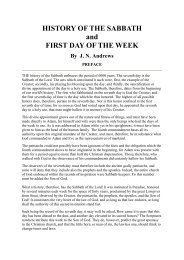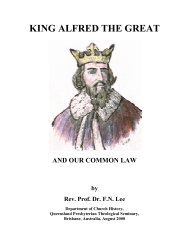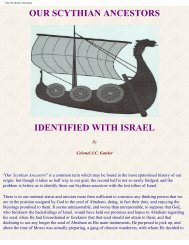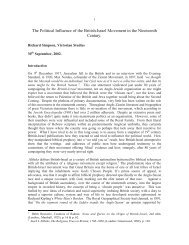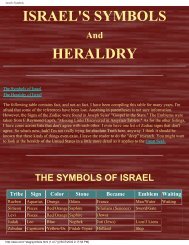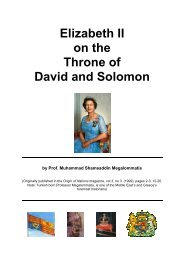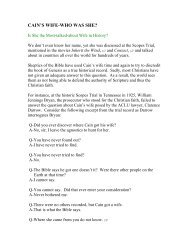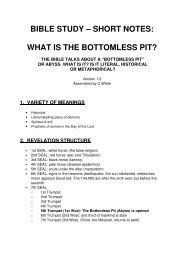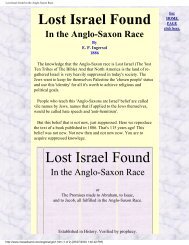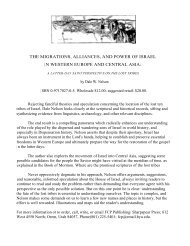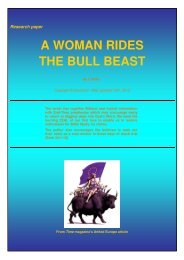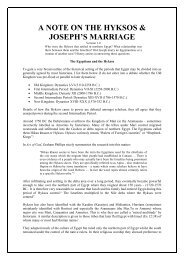The Throne of Britain: Its Biblical Origin and Future - Origin of Nations
The Throne of Britain: Its Biblical Origin and Future - Origin of Nations
The Throne of Britain: Its Biblical Origin and Future - Origin of Nations
You also want an ePaper? Increase the reach of your titles
YUMPU automatically turns print PDFs into web optimized ePapers that Google loves.
King Solomon, we are told in Scripture, “had a fleet <strong>of</strong> ships <strong>of</strong> Tarshish at sea with the fleet <strong>of</strong><br />
Hiram [the Phoenician king <strong>of</strong> Tyre]” (1 Kings 10:22, NRSV). Tarshish was an ancient port <strong>of</strong><br />
southern Spain, also known as Tartessus. It was evidently named after Tarshish, the son <strong>of</strong> Javan<br />
(Genesis 10:4)—Javan (or Yavan) being the name for Greece in the Old Testament. As an early<br />
Ionian Greek settlement, it was actually an Israelite-Phoenician colony.<br />
L<strong>and</strong>s <strong>of</strong> Iberia<br />
<strong>The</strong> l<strong>and</strong> <strong>of</strong> Spain <strong>and</strong> Portugal, it should be mentioned, is also known as the Iberian Peninsula.<br />
Notes Micros<strong>of</strong>t Encarta: “Iberia, ancient name for both the Iberian Peninsula <strong>and</strong> the country lying<br />
between the Greater Caucasus <strong>and</strong> Armenia, approximately coextensive with present-day Georgia<br />
[which is south <strong>of</strong> Russia]” (“Iberia,” 1994). <strong>The</strong> Encyclopedia <strong>of</strong> Religions states: “<strong>The</strong> Iberes <strong>of</strong><br />
the Caucasus were Georgians . . . In Sicily the Iberes were on the west . . . Spain was Iberia . . . [And<br />
the Roman historian] Tacitus speaks <strong>of</strong> Iberes in the west <strong>of</strong> Engl<strong>and</strong> [in Cornwall], who may have<br />
come from Spain” (1964, Vol. 2, p. 259).<br />
Why would Iberia be the name <strong>of</strong> places <strong>and</strong> people so far removed from each other It is<br />
probably because the Israelites—the Hebrews—migrated through both Spain <strong>and</strong> the Caucasus <strong>and</strong><br />
also went to <strong>Britain</strong>! Iber is almost identical with the name <strong>of</strong> Abraham’s ancestor Eber or Heber,<br />
father <strong>of</strong> the Hebrews (Genesis 11:15-16).<br />
Furthermore, the name Hebrew appears to have taken on an added meaning. McClintock &<br />
Strong’s Encyclopedia <strong>of</strong> <strong>Biblical</strong>, <strong>The</strong>ological <strong>and</strong> Ecclesiastical Literature adds that the word came<br />
to mean “one <strong>of</strong> the other side, i.e. . . . immigrant” (Vol. 4, p. 128). Bible translator Ferrar Fenton<br />
noted that in 1 Samuel 4:6, “Eberim, if translated, means ‘Colonists’—a fit term to be used by the<br />
Philistines <strong>of</strong> the Israelites, who were really Colonists in Palestine.” And it would be a fit term for<br />
Israelite colonists in other l<strong>and</strong>s to apply to themselves.<br />
Considering the Hebrew migration through Spain, the name <strong>of</strong> the River Ebro there would appear<br />
to be <strong>of</strong> the same origin. And the same may go for Irel<strong>and</strong>—or at least one <strong>of</strong> its earlier names. <strong>The</strong><br />
word Irel<strong>and</strong> derives from Eire-l<strong>and</strong>—Eire being the nation’s Gaelic name. Traditionally, Irel<strong>and</strong> is<br />
also called Erin. <strong>The</strong> Romans called it Hibernia or Ivernia.<br />
Harvard pr<strong>of</strong>essor Barry Fell wrote: “One <strong>of</strong> the ancient names <strong>of</strong> Irel<strong>and</strong> is Ibheriu, pronounced<br />
as Iveriu, a fact that suggests the word is derived from a still-earlier pronunciation, Iberiu. Now this is<br />
very interesting, for the Gaelic histories assert that the ancestors <strong>of</strong> the Gaels came to Irel<strong>and</strong> from<br />
Iberia, the old name <strong>of</strong> Spain. Could Iberiu be the same as Iberia, the name <strong>of</strong> the older homel<strong>and</strong><br />
having been transferred to the younger Many people, including some linguists, think this may well<br />
be the case” (America B.C.: Ancient Settlers in the New World, 1976, p. 43). <strong>The</strong> connection between<br />
Iveriu <strong>and</strong> Hebrew is even stronger when we realize that the Hebrew word for “Hebrew” is actually<br />
pronounced Ivri.<br />
However, it should be noted that while Iber is a likely root for Iberiu <strong>and</strong> the Roman names<br />
Hibernia <strong>and</strong> Ivernia, it is possible that the particular names Erin <strong>and</strong> Eire derived from another<br />
source, as we will later see. In any case, there is still a strong identification with the Iberians <strong>of</strong> Spain.<br />
Let us, then, consider the influx into Irel<strong>and</strong> <strong>of</strong> people from the Iberian Peninsula. Northwest<br />
Spain is called Galacia, apparently after the Gaels. Likewise, Portugal may mean “Port <strong>of</strong> the Gaels.”<br />
Thomas Moore, in <strong>The</strong> History <strong>of</strong> Irel<strong>and</strong>, states: “In process <strong>of</strong> time, the Tuatha-de-Danaan [in<br />
Irel<strong>and</strong>] were themselves dispossessed <strong>of</strong> their sway; a successful invasion from the coast <strong>of</strong> Spain<br />
having put an end to the Danaanian dynasty, <strong>and</strong> transferred the scepter into the h<strong>and</strong>s <strong>of</strong> that<br />
Milesian or Scotic race, which through so long a series <strong>of</strong> succeeding ages, supplied Irel<strong>and</strong> with her<br />
kings. This celebrated colony, though coming directly from Spain, was originally, we are told, <strong>of</strong><br />
Scythic race” (1837, Vol. 1, p. 61).<br />
This is truly remarkable for, as proved in our publication <strong>The</strong> United States <strong>and</strong> <strong>Britain</strong> in Bible<br />
Prophecy, the Gaels (or Celts) <strong>and</strong> Scythians were, by <strong>and</strong> large, Israelites—just like the Danaans.<br />
And apparently the ensuing conflict between the Milesians <strong>and</strong> Danaans in Irel<strong>and</strong> subsided rather<br />
quickly when it was realized that both sides were related peoples.<br />
Who were the Milesians<br />
- 9 -



